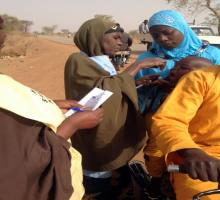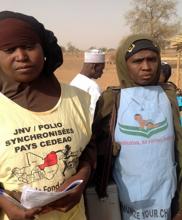Nigeria synchronizes polio immunization with Niger Republic during March 2014 round
Abuja, Nigeria 6th March, 2014 -- The synchronization of immunization activity which lasted from 1st to 4th March 2014 along border settlements between Nigeria and Republic of Niger has been concluded. The activity is widely adjudged as very successful. For instance, between Sokoto State in Nigeria and Tahoua Province in Republic of Niger, 15,137 under-five children were vaccinated on Nigeria side and 16,320 on the Republic of Niger side.
Cross-border synchronization activities remain the key to stopping poliovirus transmissions and importations between countries. To buttress this point, the last case in Republic of Niger in December 2012 was genetically linked to virus circulation in Nigeria. In view of the persisting threat of poliovirus importations between countries, the Independent Monitoring Board (IMB) of the Global Polio Eradication Initiative, recommended in its October 2013 report that the International Health Regulations (IHR) should be used to ensure that all people travelling to and from polio endemic country should be vaccinated.
Notwithstanding, the supervisor of Kwani district of Republic of Niger lamented that the porous nature of the borders, transportation routes and nomadic populations pose huge threat to the success of the synchronization activity, in addition to non-compliance especially on the Nigerian side.
To ensure the success of implementation, cross-border planning meetings were held between health ministries from both sides to develop micro-plans and supervisory plans for synchronized implementation.
Monitoring the activity jointly planned by the Republic of Niger and Nigerian Ministries of Health in Illela Local Government, Sokoto State Nigeria, the Incident Manager (IM) of the Polio Emergency Operation Center of Sokoto Nigeria, Dr. Aminu Shehu expressed satisfaction with the organization, availability of adequate vaccines as well as co-operation from both parents and security personnel at the two border posts supervised.
The WHO Sokoto State Coordinator Dr. Isameldin and consultants from UNICEF and CDC N-STOP posited that “if we get it right at the border, then the hinterland is protected”.
On their part, the vaccination teams on both sides of the border showed uncommon enthusiasm as they stopped and scrutinized every vehicle to check if the under-five children were vaccinated and provided oral polio vaccine (OPV) to unvaccinated children to avoid missing eligible children and to further optimize the opportunity presented by the location of the posts at the security check points.
Preliminary reports, so far, from settlements of participating states on the Nigeria side (Zamfara, Katsina, Kebbi, Sokoto and Jigawa) indicate that 55, 816 children have been immunized with bOPV during the border synchronization.



